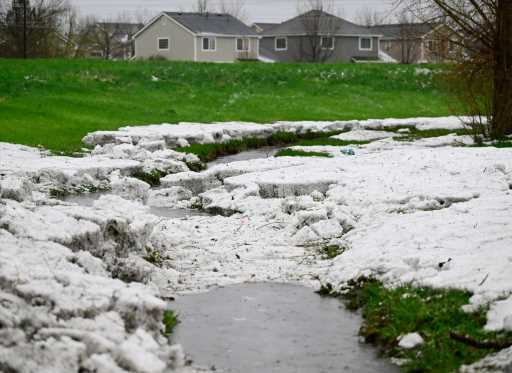Following weeks of heavy rainfall, Aurora city leaders expect to roll back drought restrictions that called for a surcharge on residents’ and business owners’ water bills if they watered their lawns more than twice per week.
Water officials cautioned though that the situation is constantly evolving, citing the way Aurora’s reservoirs are replenished outside of city limits.
“While we are not at our needed 75% of storage quite yet, both the weather and runoff projections are looking positive for the next couple of weeks and odds of needing to continue drought restrictions into July are minimal,” Aurora Water General Manager Marshall Brown told them in an email.
As of June 6, Aurora’s reservoirs were filled to 68% capacity, and the City Council will consider a resolution June 28 to remove the city’s “Stage 1 Drought” restrictions on outdoor water use.
The restrictions limited residents, multifamily units and commercial properties to watering their lawns twice a week, rather than three, starting May 1, or they would have to pay higher bills. The goal was to reduce the city’s outdoor water use by 20%. Residents’ bills should have remained similar to last summer’s as long as they stuck to the two-days-per-week rule. Any properties that had watering variance allowances for irrigation also had to reduce their use to avoid extra costs.
But with the amount of rain the area has been receiving, residents have questioned why Aurora is still under any type of restrictions. And, according to a statewide drought map, neither Colorado nor the city of Aurora are in a state of drought.
That’s mostly a matter of optics, according to Aurora Water spokesperson Greg Baker. Aurora is not in an area of drought, but the city’s reservoirs were lower than average capacity. The city’s drinking water doesn’t come from Aurora, rather from mountain snowpack that is then stored in the reservoirs.
“We use the term ‘drought stage,’” Baker said, “but it’s technically water availability — do we have enough water to meet the city’s needs for the rest of this year, and preferably well into next year, if necessary.”
When the City Council approved a move to declare Stage 1 Drought in late February, some council members and residents pointed out that surrounding cities like Denver were not making similar decisions, especially as snowpack levels appeared to be up statewide.
But those snowpack levels were a statewide average, Brown noted in an interview, and the watersheds that Aurora has rights to, particularly in the upper areas of the South Platte, received lower than average snowpack.
“We don’t really share any watersheds with Denver or northern Colorado or some of the other larger systems,” Brown said.
While conditions have been wet across the Front Range for several weeks, the water manager said a week or two of rain isn’t going to make significant changes to the city’s water storage system, which relies mostly on snowpack. But the rain has helped because the demands for water are lower and the weather has been cooler — meaning people aren’t turning on their irrigation systems as much, leaving more water in storage.
The system is recovering more quickly than projected, making the conditions about 5% above projections, according to Aurora Water. But Baker warned that the summer is still expected to be hot and dry, so he cautioned residents not to get too complacent.
“Just be aware of what hot, dry weather here is going to bring,” he said in terms of water availablility.
Under Stage 1 restrictions, water users had to pay $1.95 per 1,000 gallons of water above what would normally be their regular indoor use. So, that’s anything over about 5,000 gallons of use. Businesses and multifamily units also faced higher bills for exceeding allowed amounts.
City officials did not have an estimate of how much residents or businesses were affected by the drought surcharge yet, since June bills across the city are sent over 19 different cycles and not everyone has received their bills for this time period. But it most likely affected multi-residential properties and businesses more than individual residents who likely haven’t turned on their irrigation systems much in the last month to water their lawns, according to Baker.
Councilman Dustin Zvonek said he’s interested in seeing how much residents and businesses were affected by the changes, but he believes the city made the right decision to go forward with the drought resolution earlier this year, especially with the challenges with water and climate that Colorado is facing.
“I think you have to be driven by data on this type of decision,” Zvonek said. “And the data suggests that we should have been (in Stage 1 drought),” he said.
Zvonek is also advocating that the resolution require that the City Council review any future drought designations about every 45 days and affirmatively vote to keep a current drought stage in effect.
That’s something Councilwoman Danielle Jurinsky strongly supports because she opposed the initial drought surcharge. Jurinsky said on Monday that the city should have implemented either drought restrictions or the previously approved water rates increase and restrictions on lawns and grass, not both.
“We voted for government control over government control,” Jurinsky, an Aurora business owner, said. “This can’t happen again,” she added. “This is a joke.”
City officials and supporters of the water-saving moves, including Brown, however, say these are actions the city had to take to reduce water consumption for now and in the future as more of the city is developed.
Stay up-to-date with Colorado Politics by signing up for our weekly newsletter, The Spot.
Source: Read Full Article
